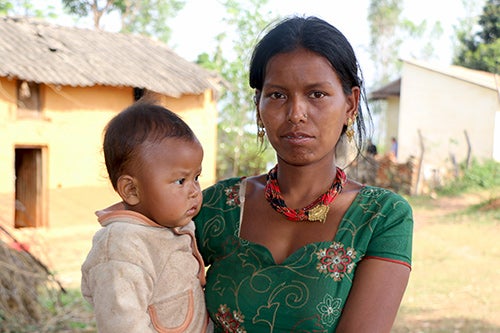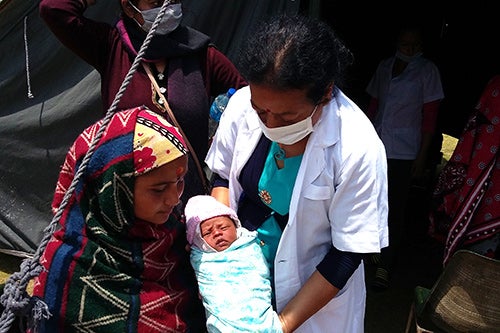News
Reaching quake-affected pregnant women in Nepal
- 05 May 2015
News
KAVRE DISTRICT, Nepal – In Nepal’s Kavre District, devastation stretches as far as the eye can see. Last week’s 7.8-magnitude earthquake flattened most of the homes in Kavre’s Rampur Village, and the majority of the area's residents – including pregnant women, new mothers and infants – are living in hastily erected camps.
Many of the pregnant women are in urgent need of obstetric care. UNFPA’s most recent estimates indicate some 126,000 pregnant women have been affected by the disaster. Sabina Danuwar, 17, is one of them.
On 4 May, the Government of Nepal reported the death toll had reached 7,365, with more than 14,300 people injured. Thirty-nine of Nepal’s 75 districts have been affected by the disaster.
UNFPA is working with partners on the ground, including the Family Planning Association of Nepal, which has established a health camp in Rampur Village that is serving hundreds of locals, most of them women, adolescent girls and children. UNFPA is also working to prevent gender-based violence, as women’s vulnerabilities are exacerbated in humanitarian crises. UNFPA and partners are distributing dignity kits, which contain essential hygiene supplies, including soap and sanitary pads, for women and girls.

Midwives are also playing a key role in providing essential health care to pregnant women and new mothers.
“We’ve set up help desks at maternity hospitals to assist pregnant women, their family members and those who’ve given birth and been discharged from the hospital,” said Kiran Bajracharya, president of the Midwifery Society of Nepal, a UNFPA partner.

“We’re also conducting community outreach clinics with a special focus on pregnant women, post-natal mothers and newborns at temporary shelters at Tudikhel Military Ground and Bhaktapur, where massive destruction has occurred. Our midwives are liaising with medical and paramedical professionals as well to collect family kits with essential supplies to distribute to earthquake victims who’ve lost everything,” she added.
“We’re seeing heartrending suffering, and doing all we can to help women deliver their babies safely, and tend to their newborns in the best way possible, despite the terrible circumstances.”